- Home
- Michelle Hodkin
The Becoming of Noah Shaw Page 2
The Becoming of Noah Shaw Read online
Page 2
I remember seeing relief there, instead.
3
THE TONIC OF WILDNESS
WHEN I FINALLY SEE MARA, she’s no longer in sight of the chapel. She’s a small Brontë character silhouetted in black, standing in the shadow of a marble tower on top of a high hill; the mausoleum containing centuries of Shaw remains, perched between and overlooking the woods and the ruins. My absence in the chapel and presence on the grounds goes either unnoticed or undealt with, because no one stops me.
I stride alongside the man-made river that pulses through the grounds. The absence of sound vibrates inside me the farther I get from the chapel. The air is thick, and even the water seems to die beneath the spot where my girl stands.
Mara bows over the bridge, her hair cascading over her shoulders as though it’s reaching for the river. She casts a slim shadow over the water. “I didn’t think,” she says, possibly to herself.
I stand next to her, resting my elbows against the old stones. “About?”
“The horses.”
“Why would you? I didn’t. If it’s anyone’s fault, it’s mine.”
Her face is in shadow—I can’t tell what she’s thinking, and I can’t hear her either—the air is unnaturally still, and my mind is as quiet now as it was loud before.
“Are they okay?” she asks.
“The horses? I’m sure they’re fine.”
“The humans?”
“I’m sure they’re fine too.”
“Are people freaking out?” A breeze ripples her curls and the water.
“The English don’t really ‘freak out.’ But I’m sure the guests are quietly aghast.”
She tilts her face to me, finally. Her eyes are impenetrable, but a slice of sun hits her shoulder, I feel her warmth through her clothes, then the softness of her skin as her fingers glance over my hand as we lean over the bridge together.
I don’t know what she’s thinking, but all I can think is that I want her against me, around me, enveloping me. I slide my hand around her waist, my fingers slipping beneath the waistband of her skirt, searching for skin.
She raises her eyebrows. “Won’t you be missed?”
I press her to me, bending so my lips graze her ear as I speak. “Probably. Ask me if I care.”
“Do you care?”
“Not even a little.”
By the time we reach the mausoleum, Mara’s breath is quick, her skin dewy. I pull her under the cold marble dome, between the columns that surround it, and press my mouth to hers, insistent, demanding. She softens against my lips, melts, and every moment is bursting—the hot slide of her tongue in my mouth, the bite of her teeth into my lower lip, and then the stiffening of her bones and muscles as her body pulls away and the tension in mine rises to a ferocious ache.
“Noah, we shouldn’t—”
“Shouldn’t . . . ?”
A resigned exhale. “We shouldn’t be here.”
“That’s precisely why we are here,” I say. I break away for one agonising moment, and the door creaks as I push it open and guide her inside.
The mausoleum is quite large, the size of a grand studio apartment in New York, perhaps. There’s a short marble altar in the centre, with Latin words and carved figures of the Four Ages of Man on each side: Infantia. Adolescentia. Virilitas. Senectas. I push her gently against Virilitas, but she pushes back.
“It’s your father’s funeral.”
“Well aware,” I say, leaning to kiss her neck. When she doesn’t move, I ask, “Do you find this inappropriate?”
“It’s . . . unusual,” she says.
“Would you like to go back?”
“Would you?”
I answer by raising her hips onto the altar and stand between her parted knees, her pleated skirt hitched up to reveal the paleness of her thighs. A slow glance slightly downward.
Her eyebrows lift as her lips part. “Are you serious?”
“Deadly.”
She bites her lower lip. “I don’t want you to regret not being there.”
“Won’t,” I say, slipping one hand beneath her shirt.
“How do you know?”
My mind returns to my mother’s funeral, my father staring at her coffin with dead eyes. “My father died the day my mother did. A monster took his place.”
“I know, but—”
“No, there’s nothing else. No one else. He’s gone—he can’t hurt anyone anymore. There’s no one and nothing in our way.” I pause, resting my fingers on the clasp of her bra. “We should celebrate.”
A laugh escapes her throat. “Not really your style.”
“No, but it is yours.”
Wide eyes slit into a cat’s slant. She bows her head, conceding. “Has anyone ever told you you use sex as a coping mechanism?”
“Yes, why?”
“Oh, no reason.” A pause fills the air. Then Mara arcs her body toward mine, her lips toward mine, and softly flicks her tongue into my mouth.
I’m split open with desire, happiness. We smile against each other’s skin, and I inhale the salt-sweat smell of her, kiss her again, on her throat. Collarbones. Her hands thread through my hair and mine reach her chest—she gasps, and the sound alone has me spinning with heat. It’s been only hours since I’ve looked at her this way, but it could be years, centuries, for all that it matters. I’m starved for her, all the time, even now—I want every part of her, to devour her, to inhale her, but I also want her slowly; to see her, to listen to her, to listen inside of her, and so I force myself to stop. To trail my fingers slowly over the soft skin of her thighs, and pull back to see her expression.
Just looking at her face unmoors me. Cheeks flushed, skin shimmering, lips red and swollen with kissing, her head is tilted back, throat arched under the dome. But she can feel me watching her and reels her head back up, takes my hands, and pulls them onto her hips. The sound of her silk skirt sliding up against her silk skin is like silver on crystal.
Who is she? Who is this girl who would allow me to do this, here, now? And how am I allowed to have her?
I kiss the inside of each knee and up, farther, the roughness of my cheek raising redness on her skin. Then she grips each of my forearms, rocks herself back, and in one agonising, shimmering moment, one of her hands reaches beneath the hem of her dress, between her legs. Then her underwear slips to the ground.
A sharp hitch of breath. Mine. My head tilts down to kiss her skin, all of it, every bit I can reach. Just as I feel the warmth of my breath meeting the warmth of her body, my mind seizes.
I’m not looking at Mara—I’m looking at a reflection in a distant, black, stagnant puddle below me. At a reflection that isn’t mine. And then I jump to meet it.
4
THE DIRECTION OF HIS DREAMS
THERE IS NO SOUND, NO air, as the rope strains against someone’s neck. Fingers claw at my throat—no, his throat—trying to undo what he’s done. Then, the thoughts—his thoughts, his voice—storm my mind.
Help me help me help me help me help me help me help me hel—
Above me, worn stone opens to grey sky as a murder of crows takes flight overhead. It’s the last thing I see through his eyes before I hear Mara scream my name.
I am in my body again, staring up at the veined white marble ceiling of the mausoleum, not at the sky, not at dark, wet stone. I see Mara in front of me, not emptiness.
“What happened?” Her voice is panicked, urgent, and I realise then that I’m gasping for air.
“Someone—” Someone what? My neck is still raw, and I reach for the rope that was just there.
“Did you see something—”
Images flicker behind my eyes, final still frames the boy captured before he died. Ruined stone, handmade tiles. A dead pigeon, a pile of feathers and bone in the corner of the . . . tower. He hung himself in a tower.
“He didn’t want it,” I say, knowing it without knowing how.
“Who?” Mara’s hands cup my face. “Noah, what happened?”
I steady myself on the altar, and my eyes fall on the heavy wooden door, opened just a crack. “He killed himself here.”
Mara is off the altar now and braced, her body humming with adrenaline. “Who?”
“I don’t know.”
“Where?”
“The ruins,” I say, leading her to the door.
I’ve never been able to hear anyone’s thoughts before. Gifted, Afflicted, Carriers, whatever the fuck we are—when one of us is dying, or about to, I feel what they feel—their pain and terror connects us. And I see what they see—enough to find out where they are, usually, but never with enough time to actually help them. I’ve grown used to failing them after I’ve seen and felt, and so many die—there’s an emptiness that bleeds in from the edges, fills up the space where Feelings should be. I don’t even feel guilty anymore—if it happens and I’m in public, I beg off and either invent an excuse (Sorry, PMS) or deflect and say/do something assholic. It’s exhausting, being a witness, being a fraction of a victim each time—and there have been more that Mara knows not of. I don’t lie to her (much), but I sweep dark things into the darkest corner of my mind so I can be with her, enjoy her, feel and see and hear her, because it’s too late for them. I can’t keep these memories in that corner forever, but I can close the door on them and step back into the present.
But not today. This one—he was different. I was in his mind—I was him, for the slightest moment. Completely dispossessed.
I’m so consumed still that I don’t even realise that Mara’s taken over leading us to the ruins until sound overwhelms me.
The air is clotted with sobs, panic, confusion—Mara can hear it, feel it too. It tightens her body, coils her muscles, and I realise she’s holding my hand to soothe me, not herself. When I look away from her, I’m rather shocked to see that we’ve already crossed the bridge.
The gravel path forks toward the chapel and toward the ruins. She’s tugging me toward the chapel—we’re close enough now to see the crowd filing out. The volume’s dialled up again, and a wave of exhaustion licks at my body.
I step back, pulling Mara closer to me. “Other way,” I say, turning from the crowd. We wind back through the wood, avoiding eyes and ears, but something squirms in my spine the nearer we get. We push past dark spiky woven branches—Mara scratches her cheek on one. The only sound is that of twigs crunching beneath our shoes, and I’m grateful.
And then we’re there, standing in the shadow of the old abbey. The smell of cold, damp earth and wet layers of leaves hooks onto childhood memories and tries reeling them to the surface of my mind. I slide them away so I can see what Mara sees instead.
Her head tilts up. “This place is . . . bigger than I thought it would be. Up close.”
“Bigger on the inside,” I say. She nods absently.
We cross beneath a carved archway, and our footsteps echo on the stone, spiralling off against the flying buttresses. The sound rings in my teeth. If I didn’t know this place so well, I wouldn’t have found him as quickly.
A massive, grassy courtyard opens up to our left, but I turn right instead, past a row of stone stumps that were once columns, toward the old bell tower. Water trickles from somewhere, and a high, rising call sounds above us, like a warning. I look up just in time to see the arc of a sparrowhawk’s wing in the corner of my eye before I see him.
Mara’s gait is steady, panther-sleek, neither disgusted nor afraid. I shouldn’t be either, but there’s a smell coming off him. I can taste it in my mouth, acrid and wild.
Fear.
I put my hand out to stop her, but my hand catches air.
The body is still swinging, barely. That’s what I notice first. Then the slight trickle of blood from his nose that runs over his lip, his chin, before the droplet falls to the still, dark puddle beneath his body.
Something in my stomach flips. I ignore that warning call again, skittering off the tower, and approach Mara. She’s standing so still I’m not even sure she’s breathing.
I’ve seen dead bodies before. The boy and girl Jude killed at Horizons to show Mara and me how willing he was to kill, full stop. Same age as us, throats slit, blood and urine staining the sand beneath their bodies, and I was immune to it. I saw-heard-felt only Mara. And there were others, but again, next to her, they didn’t register. Their soundlessness was nothing because Mara’s notes spiked higher.
This boy, though. There’s horror here. A violated dignity that scrapes at my skin. I force myself to look, to ignore the hollowness of him beating at my ears, a black hole of sound, pulling everything around us into silence. Including Mara. I hear her breath from the outside, steady and even, but nothing else. No heartbeat, no pulse, no her.
“Noah.”
I startle at her voice. “What?”
“Do you know him? I asked you twice. You were staring off at something else.” She turns her head, and I follow the line of her gaze. It stops at a bloody mess of white feathers and bone. A hawk’s kill. A dove.
“What’s wrong with you?”
I shake my head. “It’s not me, it’s him.” I force myself to look again. His fingers are beginning to blue, like his eyes—open, like his mouth, slightly parted as if he’s about to speak. The rope creaks; the sound of it fills my head.
Mara’s voice, then. “Yeah. I feel it too.”
“What?” I ask.
“He’s like a block of ice,” she says curiously.
“You touched him?”
“You know better,” she says. It’s true, she would never have done. Evidence. A defence lawyer’s daughter then and now and always.
“Here, come closer.” She puts her hand in mine and feels me stiffen, ignores it. We approach him again together.
She’s right. The cold spirals off him, chilling the air, as if he’d been dead for days instead of moments.
“Do you know him?” she asks me again, enunciating each word.
I can’t answer. My eyes keep bouncing off his face, registering only the smallest of details, refusing to assemble them into a coherent picture. It doesn’t make sense, this hollowness, my resistance, that feeling of warning in the air, pushing back against me.
“I’m not sure,” I say. There’s something familiar about him—he feels like someone I should know, though that doesn’t make any sense.
Mara’s head turns to the side. “People will come,” she says.
They should be coming already. Had it not been for the commotion—the horses, the coffin, everything—they might’ve even seen it happen.
That’s what he wanted. He wanted to be seen.
I step backward, away from him, away from Mara, my feet carrying me through arches and passages I didn’t know I remembered. Mara calls after me, but I’m drawn forward anyway, trying to hear his last thoughts instead of her voice. My footsteps echo against the stone until I stand before an iron gate.
It’s open. It shouldn’t be. I know this gate, stood before it as a boy, had to steal the key to get past it to the steps. But now it’s open, creaking with rust as I push through and climb the stairs. Moss and lichen grow on the damp stones, but I don’t slip—I remember this place, and when the staircase ends I know exactly what I’ll see.
I step out onto the ledge. If I look down, I’ll see the knot where the boy tied the rope his broken body now swings from.
But that isn’t what I see when I look down. I see Mara’s face. And fear upon it.
5
THE DESPERATE COUNTRY
YOU SCARED THE SHIT OUT of me,” she says once I’ve climbed back down. I take her hand too tightly and begin snaking our way out of the ruins.
“Did I?”
“My ‘Stop! Don’t! Come down!’ shouts didn’t give it away?”
“Wasn’t listening.” I’m still not, quite. There’s a gated exit that should bring us closer to the house without being seen. I’m sure my absence hasn’t gone entirely unnoticed, but I’d rather my presence with Mara, here, remain so.
&nbs
p; “I was screaming,” Mara says. Her voice sounds distant behind me.
“Sorry.” I duck under a low hedge archway that opens up to the old stone stable and falcon mews.
She frees her hand from mine. “Sorry?”
“You seem rather put out.”
“You’re being an asshole.”
“I am rather good at it.”
Mara stops, forcing me to turn back. She shifts on one foot; a branch snaps beneath her pointed Oxfords. “Why did you go up there?”
“Where?”
Her expression transitions from annoyance to worry. “Noah. The bell tower. The one you just climbed down from. What’s going on with you?”
“Nothing,” I lie. “I just wanted to see . . . what he saw. More than I could when he was dying.”
“You could’ve fallen.” Her face is as hard as the stones around us.
“Didn’t though. And wouldn’t have.” I reach out to touch her cheek, expecting her to shy away, but she lets me. “I know this place, Mara. I wanted to find out what I could, while I could.”
“Did you?”
“Not yet,” I say, sliding my hand down her arm before I take her hand again.
The snorting and stamping and screeching of horses and birds follows Mara as we move through as quickly as we can to the service entrance (previously known as the servants’ entrance). The door is locked.
I remember going through as a child, exploring “Below Stairs”—the old kitchen, servants’ quarters, all of it as separate and unequal from the manor above as though it were part of a different world entirely. Which it was. Is.
“We have to go in through the hall,” I say, arcing my head around. It’ll mean the grand staircase, the great hall, the centre of the house, the centre of attention.
“The great hall,” she says.
“That would be the one.”
“Where literally everyone else at the funeral will be?”
“Indeed.”
“No other way?”
“Lots, but we need to get there now. That’s the fastest, so.”
Mara squeezes my hand. Knows I’ve been wounded, somehow. She’ll ask later, but for now, silence.

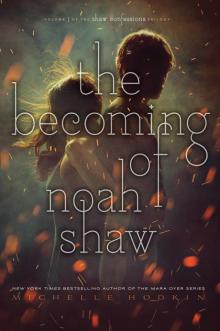 The Becoming of Noah Shaw
The Becoming of Noah Shaw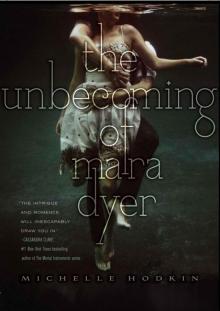 The Unbecoming of Mara Dyer
The Unbecoming of Mara Dyer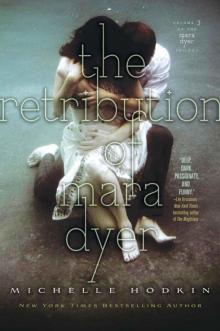 The Retribution of Mara Dyer
The Retribution of Mara Dyer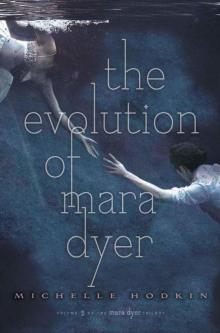 The Evolution of Mara Dyer
The Evolution of Mara Dyer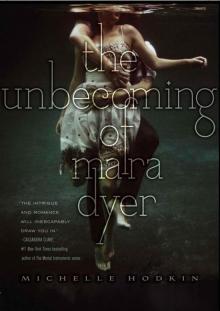 The Unbecoming of Mara Dyer md-1
The Unbecoming of Mara Dyer md-1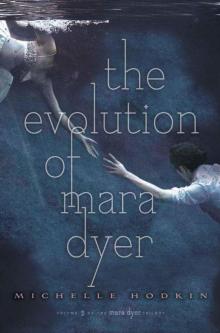 The Evolution of Mara Dyer md-2
The Evolution of Mara Dyer md-2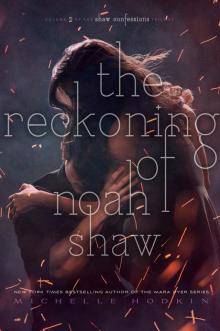 The Reckoning of Noah Shaw
The Reckoning of Noah Shaw